Preparing for a half marathon isn't just about running—it's also about fueling your body right. In this article, we'll break down the essentials of a half marathon nutrition plan, helping you optimize your energy levels and performance for race day. Whether you're a newbie or a seasoned runner, get ready to learn how to power through those 13.1 miles with confidence.
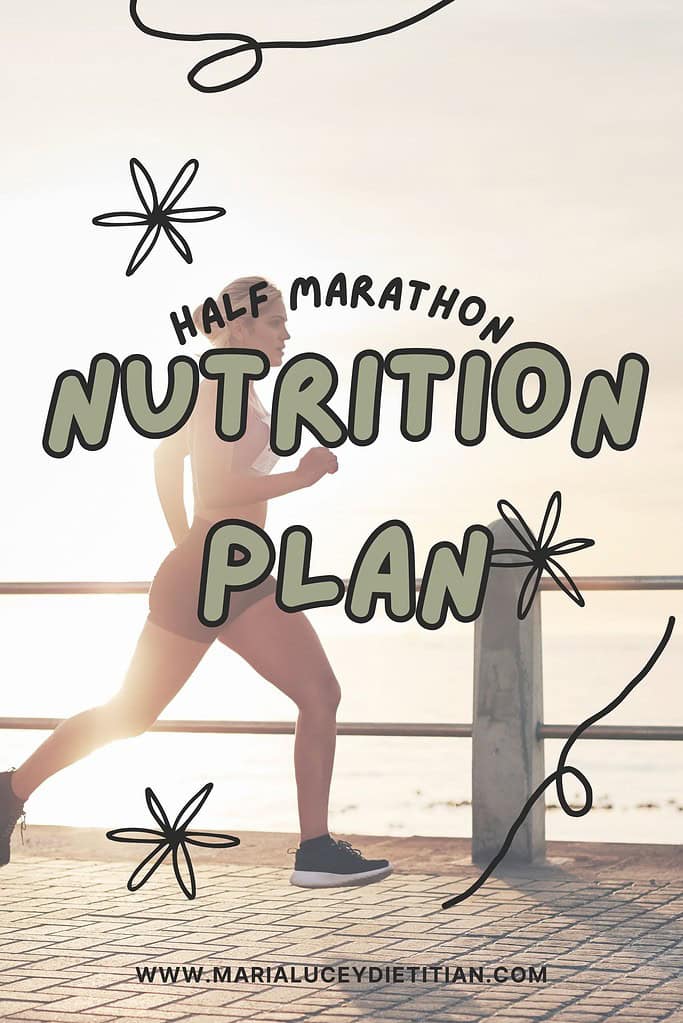
Your nutrition strategy for a half marathon is just as important as your training plan. There is no point in clocking up all these miles in the months beforehand if you're going to neglect nutrition. It is key to performing at your best and actually enjoying the whole experience.
This post is all about nutrition for a half marathon.
How Your Body Uses Fuel For Energy
When it comes to a half marathon, you have two major sources of energy: fats and carbohydrates. Regardless of what speed you run your half marathon at, you'll use a combination of the two for energy. But you'll use way more carbohydrates than fat. This is because carbohydrates are your body's preferred energy source when it comes to exercising at a moderate to high intensity and running a ½ marathon is high intensity. This means the focus should be on carbohydrates as a fuel source.
How Your Body Stores Energy
We have carbohydrate stores, which we call glycogen. These are found mainly in our muscles and some in our liver. We also have fat stores in our fat tissue.
When it comes to your fat stores, the average person has over 100,000 calories worth of energy stored as fat. So that's enough to run a half marathon many, many times over. However, when it comes to carbohydrates, the average person only has about 2000 calories worth of energy stored.
But remember, your body prefers using these glycogen stores when exercising at this high intensity so that we won't be tapping into those fat stores very much.
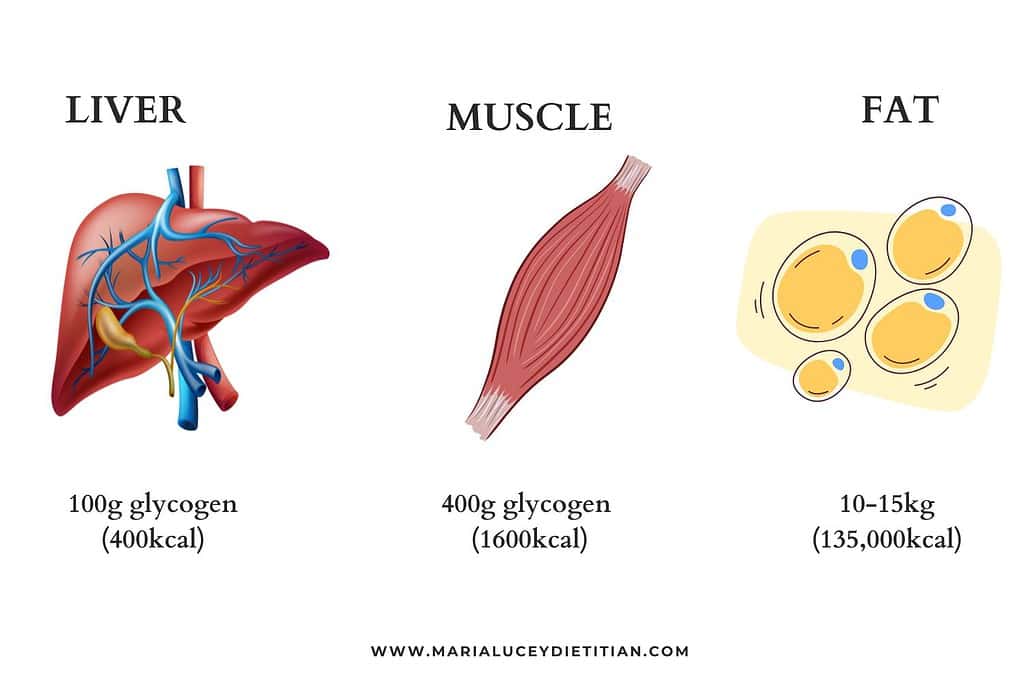
In practical terms, what this means is you'll only have enough energy from carbohydrates to get you through about 90 minutes of hard, steady exercise. And that's only if you've carb-loaded properly in the first place.
If you run out of carbohydrates during your half marathon, then it's going to be pretty miserable. This is what we call hitting the wall. It means that your carbohydrates get to such a low level that you will have to slow your pace down because you won't be able to maintain it, and it will suck. So, let's avoid that happening!
What to Eat In The Weeks Leading Up To The Half Marathon
You should start thinking about your nutrition strategy weeks before your race because eating well during your training can help you train at a higher intensity, reduce the risk of injury, promote recovery, and feel at your best physically.
Carbohydrates
So, we are going to start by looking at carbohydrates. A mistake a lot of people make, and one I myself have made, is focusing way too much on protein. Protein is very important (I've made a full guide on this), particularly if you are trying to lose weight or change your body composition, but you can't overlook carbohydrates. Carbohydrates are the fuel for the muscles. And if we are running a half marathon, you definitely want a tank full of fuel.
I want you to think about fueling for a half marathon just like you would fuel a car.
The faster you drive your car, the further you drive, and the more frequently you drive, the more petrol you need. Similarly, for our bodies, the further you run, the more frequently you’re running, and the faster you run, the more carbohydrates you need to eat.
As I mentioned, we also store carbohydrates in our muscles and liver, which are our fuel tanks. Just like the difference between a big car having a big tank for gas and a little car having a smaller tank for gas, overall muscle mass dictates how much fuel we can store. So, a bigger person will store more.
Just like you would choose a car with a full tank of gas before going on a long trip, you should also choose muscles full of glycogen before heading out on a run.
Think of the quality of your food, too. If you put petrol into a diesel car, it won't run very well, or maybe it won't run at all. Similarly, if you don't put good-quality food into your body, it won't run as efficiently either.
How Do We Optimise Our Carbohydrate Stores?
Number 1. Eating enough Carbohydrates Every Single Day
We can calculate our carbohydrate requirements using the table below from the INTERNATIONAL OLYMPIC COMMITTEE. Most people training for a half marathon (or even just regular gymgoers and cross-fitters) will fall into the moderate category, maybe even higher. This means you need to consume 5-7g of carbohydrates per kg of body weight per day. That is a lot of carbohydrates! And I believe many regular gym goers are not meeting this.
TOP TIP: It can be a useful activity to track your food for a day or 2 and see where you fall and if you're meeting this.
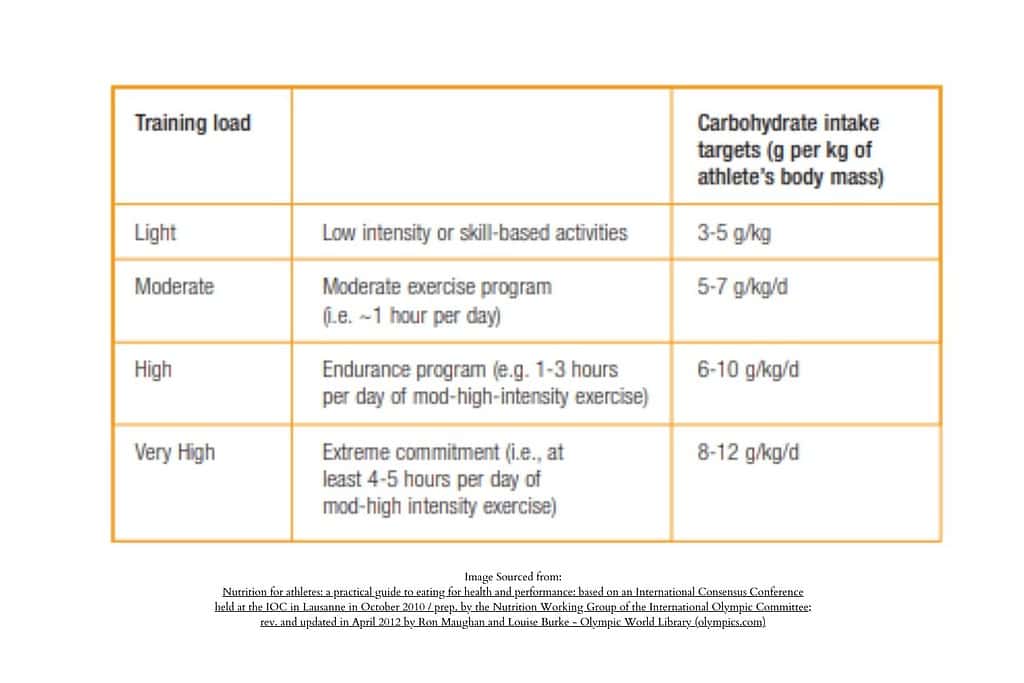
So, in practical terms, what does this look like? A 60kg person might want to try to have at least 5g CHO/kg/d = 300g CHO. I've made a 300g carbohydrate meal plan below to give you a rough idea.
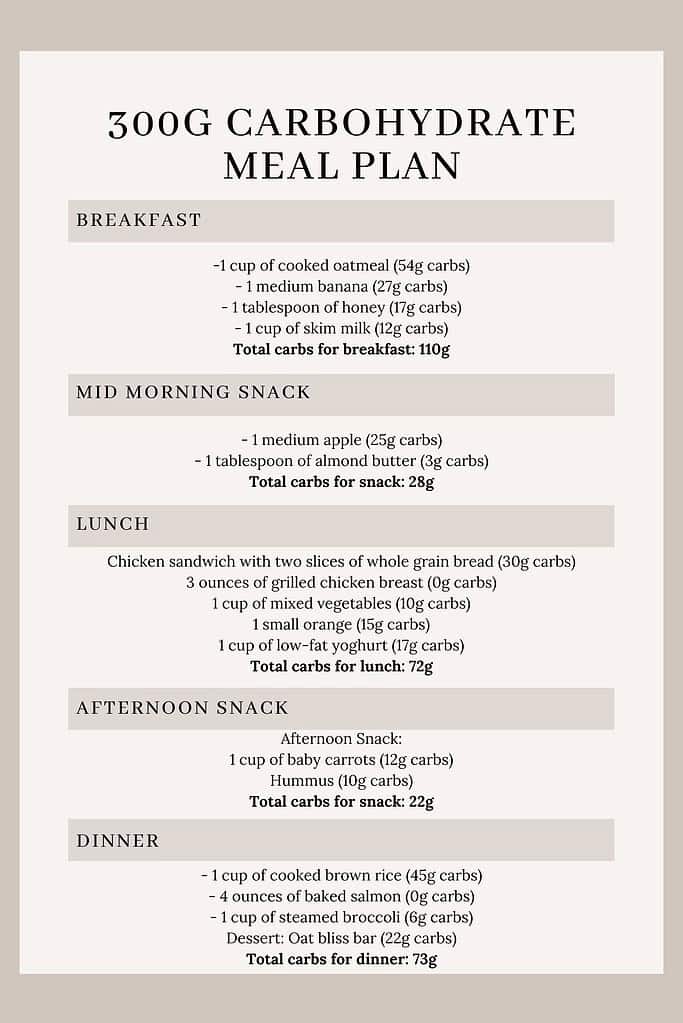
Number 2: Utilise the post-workout window
The next thing we can do to make sure we are optimising our glycogen stores is utilising the post-workout window. Research has shown that during the first two hours after exercise, glycogen replenishment is most rapid at approximately one-and-a-half times the normal rate (Ivy et al., 1988). During the subsequent four hours, the rate slows but remains higher than normal. After this period, glycogen manufacture returns to its normal rate. Therefore, eating carbohydrates during the first few hours after exercise will promote faster glycogen recovery.
Practice Window
The weeks before are also really important because this is when you're going to start practising your nutrition strategy. Please do not take any of the advice in this article and utilise it for the first time the day of or the day before the half marathon. Just like we train our legs to take the distance, we can also train our gut to take nutrition when we're running.
Even if you think you have a well-behaved gut, when you run at the intensity of a ½ marathon for 90 minutes or more, the blood flow starts to get directed away from your gut. Instead, it is directed towards your muscles, and as you work harder, the amount of nutrition that you can absorb decreases, so this can set off gastrointestinal upset in even the most gut-behaved people.
Running is a sport in which you must be careful about what and how much nutrition you consume.
You also need to practice your intended half-marathon nutrition at a half-marathon pace. And this is a really important point that most runners forget. Don't just practice it before your short and easy runs, which aren't at your half marathon pace, and expect it to be the same race day.
What To Eat In The Days Leading Up To The Half Marathon
Contrary to popular belief, you don't need to carb load for a week before the half marathon.
The first change that should happen is that about two to three days out before your event, you should start transitioning to a lower-fibre diet. Reducing fibre in your diet before a half marathon is helpful because fibre takes longer and is harder to digest. This means that if you consume a high-fibre diet up until the point of your event, there's a much higher likelihood that there will still be lots of that in your gut, which will contribute to a higher risk of gastrointestinal problems during the run. This means reducing the amount of vegetables, nuts, and seeds you eat and fruit with skin on and changing from wholegrain carbohydrates to white varieties.
Carbohydrate Loading
The next topic to cover is carb loading, which is often really misunderstood. It can be quite hard to actually do it properly, but it has the potential to significantly impact your performance and how well you feel during a half marathon.
Do You Need to Carb Load?
Well, remember at the beginning I mentioned you have enough carbs stored for about 90 minutes of hard, steady exercise. This should give you an idea. If you're expecting your half marathon to take longer than 90 minutes, then carb-loading is definitely something that's worth doing. But if it's going to be under 90 minutes, then the potential benefit is less. But my typical advice is to say do it anyway. And that's because the potential benefits far outweigh the potential negatives of carb loading. We know that carb loading can:
(1) Postpone fatigue by approximately 20% and
(2) Increase performance by 2-3% during endurance events.
So, if you're expecting to do the ½ marathon in 2 hours, you could potentially shave 3 mins and 40 seconds off your time if you follow a proper carb-loading protocol. That is a big difference, in my opinion.
How To Carb Load
So, the aim of carb loading is to maximize your body's store of carbohydrates or glycogen in your muscles so that you start your half marathon with as much fuel in the tank as possible. A lot of runners think that carb loading is just having a big pasta meal or pizza the night before your half marathon. But it is way more than that.
So, let's go through some of the main points for carb loading.
(1) You should start carb loading about 36-48 hours before the start of your half marathon. This gives you enough time to build up your carb stores.
(2) You don't need to go low carb first to properly carb load. Research has shown that it's just not necessary, and to be honest, it will probably make you feel awful.
(3) The goal is to eat 10 grams of carbohydrates per kilogram of body weight per day. You have to eat a lot of carbohydrates to carb load properly, so that should be your main focus.
(4) Take a low-fibre, low fat and low to moderate protein approach. Fat fibre and proteins take longer and are harder to digest. In a normal healthy diet, they are great; we want lots of these, but definitely reduce them in the carb loading period.
(5) Eat more in the morning and less in the evening. You want to consume your bigger meals earlier in the day. This way, you'll feel less full before you go to bed, which should mean that you sleep better before the big day. Make your last big meal at lunchtime, not late in the evening, then a smaller meal at least 2 -3 before bedtime. This will ensure enough time to digest your food so you won’t feel bloated on the morning of the race. Good options include a simple pasta dish, rice with chicken or beans or jacket potato with hummus or tuna. Avoid any new or untried foods or food combinations in case they upset your stomach.
(6) Do not perform prolonged intense training during the carb loading period. When you train hard, you damage your muscle tissue, which doesn't store carbohydrates as effectively. Your hard training should now be done and will not contribute to better fitness at this stage.
Modified Carb Loading Protocol
Now, in practice, for many, it can be quite difficult to reach that 10g CHO per kg. So, if you were struggling to do this, I would recommend not going to extremes.
Instead, the week of:
- Prioritize carbohydrates in all your main meals throughout the week to support the replenishment of glycogen and carbohydrate-rich snacks, too.
- If you struggle with food volume, add extra carbs by adding low-volume carbs like honey, dried fruits, and smoothies.
- If you do any training or runs, really prioritize consuming carbohydrates within the 2 hours following a session because, as I mentioned earlier, glycogen replenishment occurs at a faster rate here and returns to its normal rate after 4 hours.
- Consider tapering down your running leading up to the ½ marathon anyway.
Hydration
Now, you also want to start thinking about your hydration in the days before the half marathon. Because just chugging loads of water the morning of is inefficient; it will just be slugging around in your stomach, making you feel uncomfortable.
Instead, you need to hydrate regularly throughout the days before. Plus, if your carb loads properly, you will probably find that you are getting thirstier than usual.
How much fluid we each need is very variable, and the generic 2-litre or 8 cups of fluid a day advice isn't very useful. Instead, we usually need 35mls fluid/kg/d, but again, if you're in a hot climate or moving a lot, you will need more. So, the best way to tell if you're adequately hydrated is by looking at your urine, which should be pale yellow.
What To Eat The Morning Of Your Half Marathon
Breakfast is massively important, but probably not for the reason that you expect. I would always recommend it. I would not be attempting a ½ marathon fasted, that sounds miserable and will definitly impact your performance! But the aim of breakfast isn't to be super filling and to power you through your race. Instead, it's actually just to make you feel good and reduce the sensation of hunger. It will also give your carb stores a little bit of a top-up as they will naturally reduce a small bit after you have fasted in your sleep overnight.
But the main source of energy for your half marathon is going to be the carb-loading period and all of those carbohydrates that you've stored as glycogen. A big breakfast will just make you feel overfull and increase the risk of gastrointestinal symptoms during the race itself.
So, I'd suggest having breakfast at least two hours before your race, but this is personal; it might need to be up to about four hours. This will give you time to digest the food and for your stomach to settle.
RULE of thumb - the closer your meal is to the start time, the smaller it should be.
To keep things simple, have a carbohydrate-focused, moderately-sized plate or bowl of something which you can enjoy. You want this meal to be low in fat, fibre, and low to moderate protein.
Good examples would be a bagel and peanut butter, a bowl of porridge made with milk, or a bowl of lower-fibre cereal.
If you can't stomach solid food before a half marathon, that's okay because sports drinks, milk, and smoothies work, too.
BUT always practice your pre-race breakfast.
Pre-Half Marathon Snack
Now, if you have managed to have breakfast a couple of hours before your race, then it might be a good idea to have a small snack around 30 minutes before your ½ marathon starts. As you might have guessed, this should be carbohydrate-focused. And it should be something that's simple and easy to digest. It could be something like a gel that's in a readily absorbable form of carbohydrates and shouldn't cause much GI distress, or it could be some dried fruit or a banana.
What To Drink The Morning Of Your Half Marathon
Official guidelines from the American College of Sports Medicine recommend drinking 5 – 10 ml/ kg/ BW slowly in the 2- 4 hours before exercise. That is equivalent to 300- 600 mls of fluid for a 60kg person. If your urine is dark, you should continue drinking. Again, you are aiming for that pale yellow colour.
What To Eat During Your Half Marathon
Now, during the race itself, you will need to take in extra carbohydrates because it's unlikely you will have enough glycogen to last you over 90 minutes or through 13.1 miles.
When we discuss how many carbohydrates you should consume during a run, we refer to grams of carbohydrates per hour.
Most people will want to run a half marathon in 90 minutes to two and a half to three hours. For a half marathon distance, you should aim to consume between 30 and 60 grams of carbohydrates per hour.
Working backwards:
Take, for example, you expect to do the ½ marathon in two hours. And you're aiming for 30g CHO per hour. You will need 60g of CHO over the course of the run.
In practice:
Take your chosen nutritional product and look at the nutritional label. It'll tell you the total carbohydrates. For example, if a sports gel that you are hoping to consume has 20g of carbs, you will need to consume at least 3 of these.
I'd suggest that you start taking your nutrition on as soon as you've settled into your stride, which, for most people, is within about 30 to 40 minutes, and then consume carbs every 20 – 30 minutes.
Now, this might sound early, and you might be thinking, but I'm not going to be tired at that point and not going actually to need the energy. So, should I really bother? But the answer is yes, you definitely should. This is because anything that you consume takes a little bit of time to get into your body. And when we're talking about a gel, it might take around 30-45 minutes.
So you're pre-emptying this and making sure that your carbohydrates or your glycogen stores are staying topped up to get you to the end of the race. If you leave it for an hour or so or until you're really starting to struggle, then it's too late.
Some examples of foods you could use and the carbohydrates they contain are listed below.
- 500ml Isotonic sports drink (lucozade sport) = 32g CHO
- 1 large banana 30g CHO
- 1 Kinetica gel = 24g
- 1 High 5 gel = 23g
- SIS GO ISOTONIC ENERGY GEL = 22g
- SIS Beta fuel = 40g CHO
- 8 jelly babies = 42g
- 1 nature valley crunch =27g
- 1 squares bar = 27g
- 2 medjool dates = 30g CHO
What Type Of Food Should You Choose?
In practice, a lot of people like sports gels. They're easy to carry, easy to consume, and they're well-tolerated by your body. If you don't want to use those, then you can use sports-specific chew bloks or sports bars, but you just have to make sure you practice those during training and that you get on with them.
What To Drink During Your Half Marathon
There are no strict rules, as everyone is different! Everyone has different sweat rates and sweat compositions. Current advice suggests drinking to thirst for a half marathon distance. If you have really high sweat losses, You can calculate your sweat rate and make a more specific drinking plan. However, drinking to thirst should be ok and is less complicated for most people.
Now, when we lose fluid, we also lose electrolytes, the main one being sodium, so maintaining a good sodium balance is crucial.
Most sports products, like gels, will also contain electrolytes, or an isotonic sports drink is a good idea, too.
Examples of isotonic drinks include Gatorade, Lucozade Sport, Powerade and High 5.
Most of these sports drinks provide 20-40g of carbohydrates per 500 ml, so you'll get some hydration, some salt, and some carbohydrates all in one. In practice for your half marathon, there will be hydration stops every few miles along the route, so make use of these. Check ahead to see where on the course they will be and what they will provide.
What To Eat After Your Half Marathon
Now you have gotten to the finish line, what is next?
There are 3Rs to recovery.
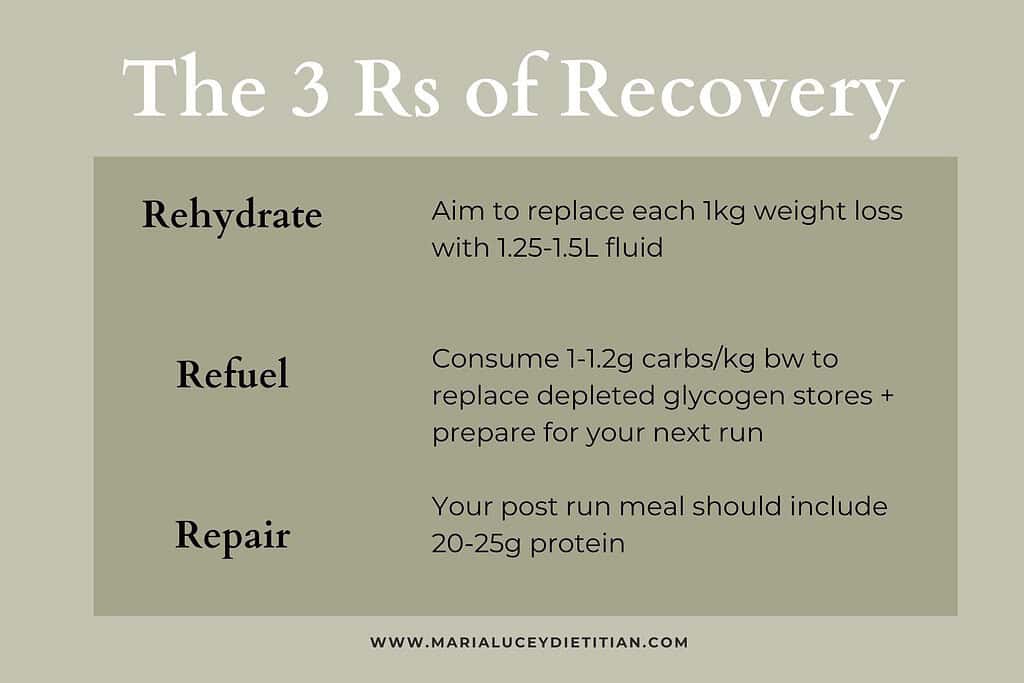
Rehydrate – You continue sweating after you have finished, so make sure you keep drinking and hydrating during the hours after you have finished. You need both water and sodium, which can be achieved through water and food or a sports drink containing sodium.
Refuel – This is your carbohydrates. Again, refuelling is faster than normal during the first 2 hours, so consuming carbohydrates during this period is a smart move.
Rebuild – Aim for approx. 20-25g protein/meal.
Good refuelling options can be as simple as chocolate-flavoured milk or a wholemeal turkey and avocado sandwich. It doesn't need to be complicated. And many people won't have a big appetite straight after, so a nourishing, substantial snack is a good idea here.
I hope you found this article helpful. If you have any questions, please comment below or reach out to me on social media. Best of luck in your half marathon!
Connect with Maria Lucey, RD!
Don’t forget to follow me on Instagram, YouTube, and Pinterest so you never miss a new recipe or blog post.
Recipes You May Enjoy:
- 💫The Original Baileys Cheesecake Recipe – Irish Cream No-Bake Cheesecake
- 💫Almond Butter Energy Balls Recipe
- 💫5 Ingredient Oat Breakfast Bars
More about the author:
Hi there! My name is Maria, and I am a Registered Dietitian practising in Ireland and Bermuda. I have extensive experience in helping clients improve their health through the power of good nutrition. I hope you enjoyed this recipe. If you have any questions or concerns, please do not hesitate to contact me. Additionally, if there are nutrition topics or recipes you would like me to make in future posts, please let me know. I would be more than happy to help.
Stay happy and healthy 💚
Your Registered Dietitian
Maria xox
Check me out on YouTube!
🎥 Visit my YouTube Channel to learn more about my approach to eating and see many of my healthy recipes.





Leave a Reply